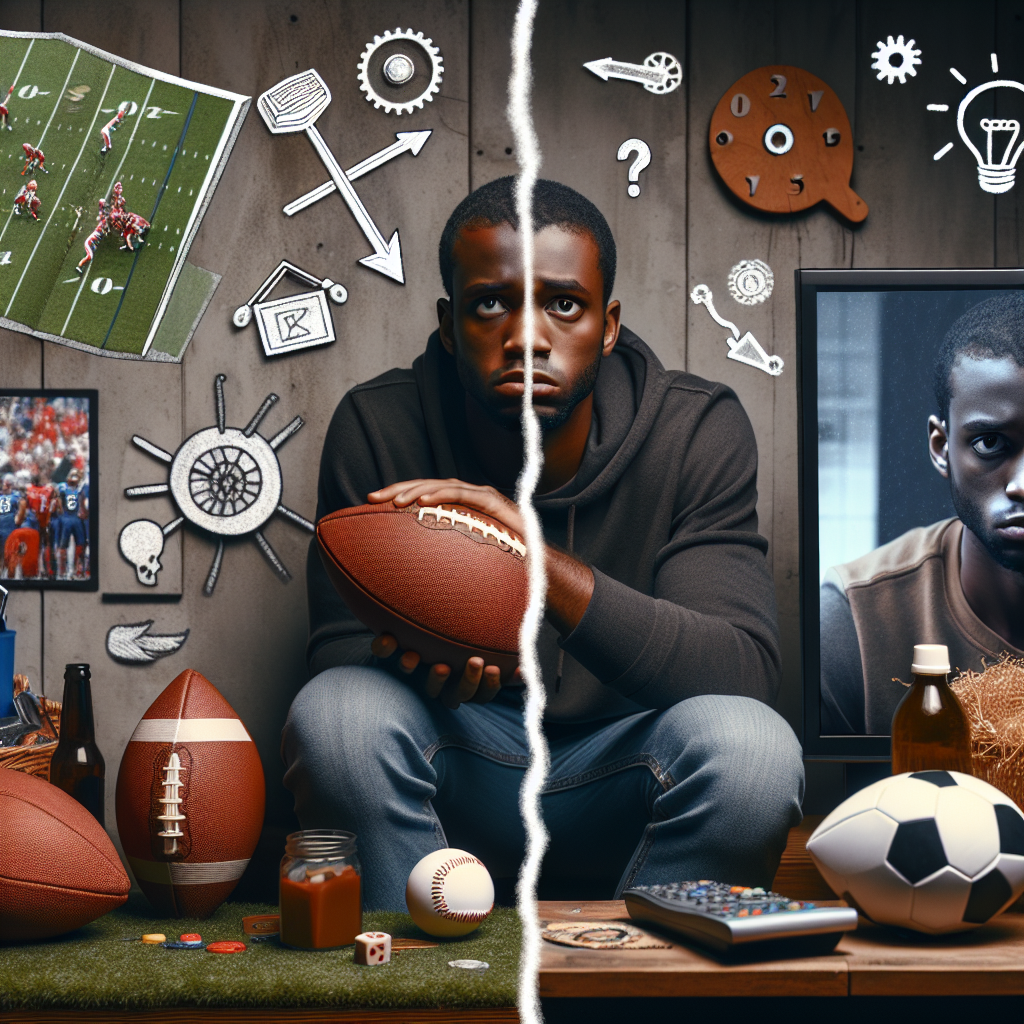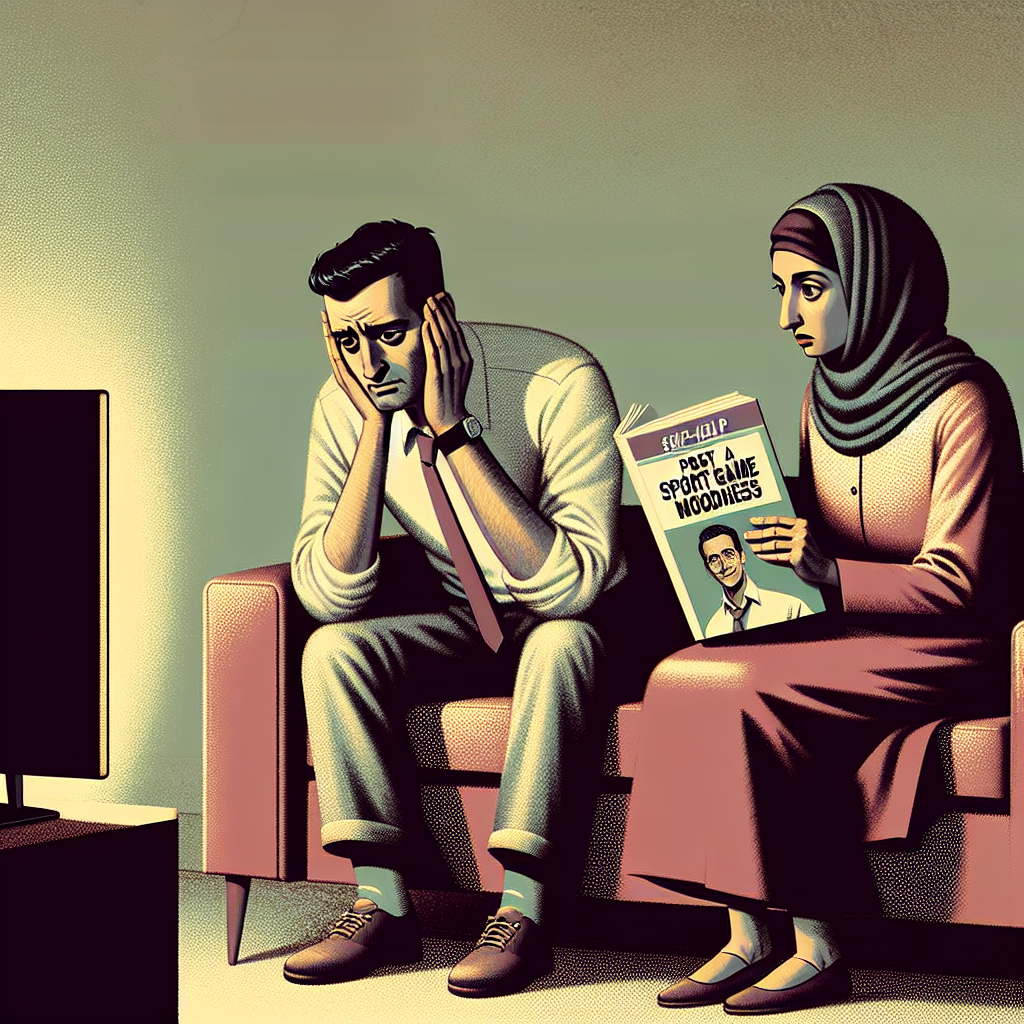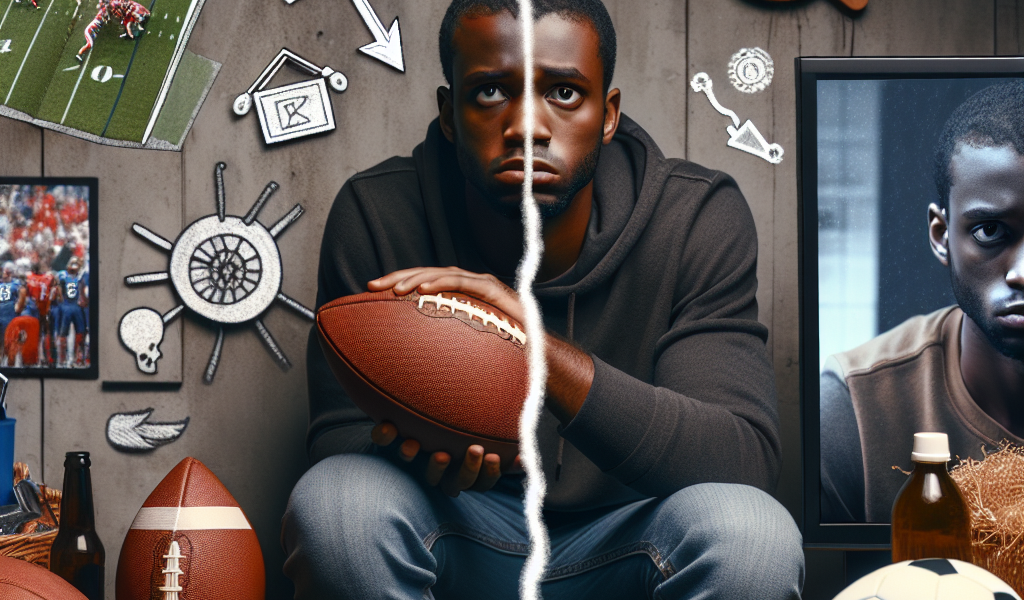Have you ever wondered why your boyfriend’s mood seems to take a nosedive after watching sports games? It’s a perplexing behavior that many partners have noticed, and while it may seem baffling at first, there can be underlying reasons for this sudden shift in demeanor. In this article, we will explore some possible explanations for why your boyfriend might experience moodiness after sports games, helping you gain a better understanding of this curious behavior and how to navigate it in your relationship. So, let’s delve into the world of sports-induced mood swings and uncover the reasons behind them.
The Psychology Behind Sports Games
The Emotional Rollercoaster of Sports
Sports games have the unique ability to take you on an emotional rollercoaster ride. From the exhilaration of victory to the disappointment of defeat, the range of emotions experienced during a game can be intense. The ups and downs of sports can trigger powerful emotional responses, and understanding the psychology behind these reactions can shed light on why your boyfriend may become moody after sports games.
The Influence of Competition
Competition plays a significant role in the psychology of sports games. The desire to win and to outperform opponents can create a high-stakes environment that can evoke intense emotions. The competitive nature of sports can trigger feelings of pressure, anxiety, and the fear of failure. For your boyfriend, the pressures associated with competing in a sports game may contribute to his moodiness afterward.
The Impact of Sports on Identity
Sports can have a profound impact on one’s sense of identity. Athletes often develop a strong attachment to their sport, and their performance in games can become intertwined with their sense of self-worth. When your boyfriend participates in sports games, his identity as an athlete is on the line, and any perceived failures or disappointments can directly impact his self-image. This connection between sports and identity may be a factor in his post-game moodiness.
The Role of Adrenaline
During sports games, the body releases adrenaline in response to the heightened physiological and psychological arousal. Adrenaline is a stress hormone that prepares the body for intense physical activity. The rush of adrenaline can lead to increased heart rate, heightened alertness, and a surge of energy. However, once the game is over, the sudden drop in adrenaline levels can leave individuals feeling drained and emotionally depleted. This crash after the adrenaline rush may be a contributing factor to your boyfriend’s moodiness post-game.
The Effect of Expectations
High Stakes and Performance Pressure
Expectations can play a significant role in the psychology of sports games. Whether it is self-imposed or comes from external sources such as coaches or teammates, the pressure to perform well can be overwhelming. Your boyfriend may feel intense pressure to meet his own high standards or fear disappointing others. This pressure can create a sense of anxiety and stress, leading to moodiness following the game.
Fear of Disappointment
The fear of disappointment can be a powerful force in sports psychology. Athletes often invest a significant amount of time, effort, and emotional energy into their chosen sport. The fear of falling short of expectations or not meeting personal goals can be deeply unsettling. Your boyfriend’s moodiness after sports games may be a reflection of his fear of disappointing himself or others.
Dealing with Insecurity
Insecurity can also influence an athlete’s emotional state after a sports game. The constant evaluation of performance and comparison to others can breed feelings of inadequacy and self-doubt. Your boyfriend may become moody as he grapples with feelings of insecurity about his abilities, especially if he perceives himself as not living up to his own or others’ expectations.
Coping with Losses
Losses in sports games can be particularly challenging for athletes to handle. Whether it’s a defeat that occurred despite their best efforts or a disappointing performance, the emotional toll of losing can be significant. Your boyfriend’s moodiness may stem from the frustration, disappointment, and sadness that can accompany a loss. Processing these emotions and finding healthy coping mechanisms is crucial for athletes to bounce back and regain their emotional balance.
The Connection to Personal Value
Validation and Self-Worth
Sports games offer athletes a chance for validation and a sense of self-worth. Success in sports can bolster one’s confidence and reaffirm their belief in their abilities. When your boyfriend experiences success in a game, it boosts his self-esteem and leaves him feeling positive. Conversely, if the game does not go well or if he feels he has underperformed, it can lead to a decrease in self-worth and potentially contribute to his moodiness.
Identification with a Team
Being part of a sports team provides individuals with a sense of belonging and camaraderie. Your boyfriend may identify strongly with his team, and the team’s success or failure can impact his emotional state. When the team performs poorly or loses, he may internalize these outcomes and experience negative emotions as a result. The emotional connection and investment he has in the team may contribute to his post-game moodiness.
The Tribal Aspect of Sports
Sports can tap into a primal instinct of tribalism, with fans feeling a deep sense of loyalty and belonging to their team. This tribal aspect of sports can be both exhilarating and overwhelming. When your boyfriend’s team wins, the joy and satisfaction of being part of that tribe can be intoxicating. However, when the team loses, it can lead to feelings of disappointment and frustration. These emotional fluctuations tied to the tribal nature of sports can be a factor in his moodiness after games.
Loss of Control in Fans
As a sports fan, your boyfriend may experience a loss of control over the outcome of a game. This powerlessness can be emotionally challenging, as he invests time and energy into supporting his team. When the game does not go as desired, feelings of frustration and irritability may arise. The emotional highs and lows associated with supporting a team can contribute to his post-game moodiness.
The Physiology of Sports Games
The Physical Toll of Sports
Participating in sports games can take a significant toll on an athlete’s body. The physical demands, such as running, jumping, and tackling, can lead to muscle fatigue, soreness, and even injuries. Your boyfriend’s moodiness after sports games may be a result of physical exhaustion and discomfort. It’s important for athletes to prioritize rest, recovery, and proper self-care to manage the physical toll of sports.
Changes in Hormonal Levels
Engaging in sports games can trigger fluctuations in hormonal levels. Physical activity releases endorphins, which are natural mood-boosting chemicals, leading to feelings of happiness and satisfaction. However, the intense levels of stress and pressure associated with sports games can also trigger the release of cortisol, a stress hormone. The hormonal imbalance caused by these events can contribute to your boyfriend’s moodiness.
Post-Game Exhaustion
Playing in a sports game can be physically and mentally draining. The combination of physical exertion, heightened emotions, and the focus required during the game can leave athletes feeling exhausted afterward. Your boyfriend’s moodiness may be a result of post-game fatigue and the need for rest and recovery. Encouraging him to prioritize self-care and relaxation can help alleviate these post-game feelings of exhaustion.
The Role of Endorphins
Sports games can lead to the release of endorphins, which are chemicals that act as natural painkillers and mood elevators. When your boyfriend participates in a game, the rush of endorphins can create a sense of euphoria and excitement. However, once the game is over, the sudden drop in endorphin levels can leave him feeling emotionally low. This chemical fluctuation may contribute to his moodiness post-game.
The Influence of Social Dynamics
The Impact of Social Comparison
In the realm of sports, comparisons between athletes are inevitable. Athletes often compare their performance to their teammates and opponents, measuring their abilities and achievements against others. Your boyfriend may become moody if he perceives himself as falling short compared to others. The pressure to measure up to high standards and constant social comparison can affect his emotional state.
Team Dynamics and Relationships
Being part of a sports team involves complex relationships and dynamics. These relationships can significantly impact an athlete’s emotional well-being. If there are conflicts or tension within the team, it can create a negative atmosphere and contribute to moodiness. Similarly, positive and supportive relationships can enhance an athlete’s overall experience and foster a more positive post-game mood.
Peer Pressure and Reactions
Peer pressure is prevalent in the world of sports. Athletes may feel pressure from teammates, coaches, or even fans to perform well and succeed. The fear of disappointing others or facing criticism can create a sense of stress and anxiety. Your boyfriend’s moodiness may stem from the pressure he feels to meet external expectations and the fear of negative reactions from others.
The Need for Acceptance
The need for acceptance is a fundamental human desire, and it is especially pronounced in sports. Athletes often seek validation and acceptance from their teammates, coaches, and even fans. When an athlete’s performance or the team’s outcome doesn’t meet expectations, it can have a profound impact on their emotional state. Your boyfriend’s moodiness may be rooted in his need for acceptance and recognition from those around him.
Cultural and Societal Factors
Sports as a Masculinity Norm
Sports are often associated with traditional masculinity norms in many cultures and societies. The emphasis on physical strength, competitiveness, and toughness can create pressure for male athletes to conform to these expectations. If your boyfriend perceives that he fell short of these norms during a game, it may lead to feelings of inadequacy and contribute to his post-game moodiness.
Societal Expectations and Stereotypes
Societal expectations and stereotypes surrounding sports can also influence an athlete’s emotional state. It’s common for society to place high value on winning, success, and performance in sports. These expectations can create intense pressure for athletes to excel and can contribute to fear of failure and disappointment. Your boyfriend’s moodiness may be a response to these societal pressures and the weight he feels to meet them.
Socialization and Upbringing
Socialization and upbringing play a significant role in an individual’s relationship with sports. The way an individual was raised and the messages they received about sports can shape their emotional responses to games. If your boyfriend was raised in an environment where sporting achievements were highly valued, it may explain why he becomes more moody after games. Understanding his upbringing can provide insight into his emotional reactions.
The Role of Media and Fan Culture
Media and fan culture can also influence an athlete’s emotional experience with sports games. The constant coverage, analysis, and scrutiny from media outlets can amplify the pressure and intensity of sports. Additionally, fan culture, both online and offline, can contribute to the emotional atmosphere surrounding sports. The relentless focus on performance and the often harsh criticisms can impact an athlete’s emotional state. Your boyfriend’s exposure to media and fan culture may contribute to his post-game moodiness.

The Connection Between Mood and Performance
Frustration with Personal Performance
When an athlete feels that their performance did not meet their own expectations, frustration can set in. Your boyfriend’s moodiness may stem from his dissatisfaction with his individual performance during a game. The frustration of not playing up to his own standards or missing opportunities can leave him in a negative emotional state.
Dissatisfaction with Team Performance
In team sports, the performance of the entire team matters. If your boyfriend’s team underperforms or fails to achieve desired results, it can lead to his post-game moodiness. The emotional investment he has in the success of the team and the collective disappointment can contribute to his moodiness. The frustration of not meeting team goals may result in negative emotions.
Anger and Aggression
Intense emotions such as anger and aggression can arise during sports games. The competitive nature of sports can lead to heated moments and confrontations with opponents or referees. Your boyfriend’s moodiness may be a result of lingering anger or frustration from such incidents during the game. It is essential to address these emotions in a healthy manner to prevent adverse consequences for your relationship.
The Influence of Sports Injuries
Injuries are a common occurrence in sports, and they can have a significant impact on an athlete’s emotional state. Sustaining an injury during a game can be emotionally devastating, as it can disrupt an athlete’s progress and sideline them from participating. If your boyfriend is dealing with a sports injury, his moodiness may be a result of the frustration, disappointment, and uncertainty associated with the injury and its implications for his future performance.
Coping Mechanisms and Solutions
Emotional Regulation Techniques
Learning effective emotional regulation techniques can help athletes manage their emotions after sports games. Encourage your boyfriend to practice deep breathing exercises, mindfulness, or journaling as tools to process and regulate his emotions. These techniques can assist in calming his mind and promoting a sense of emotional balance.
Healthy Communication Strategies
Open and honest communication is crucial for athletes to express their emotions and seek support. Encourage your boyfriend to communicate his feelings and concerns with you or a trusted friend. Having a safe space to share his experiences can help him process his emotions and prevent them from becoming overwhelming.
Post-Game Decompression
After a sports game, athletes benefit from allowing themselves time to decompress and recover emotionally. Encourage your boyfriend to engage in activities that help him relax and unwind, such as taking a bath, reading, or engaging in hobbies. Creating a post-game routine that incorporates self-care can help him transition from the intensity of the game to a more grounded and balanced state.
Seeking Professional Help
If your boyfriend’s moodiness after sports games becomes persistent and begins to negatively impact his overall well-being, it may be beneficial to seek professional help. A sports psychologist can provide valuable guidance and support in developing coping mechanisms specific to the challenges athletes face. They can help your boyfriend navigate his emotional experiences and work towards a healthier and more positive post-game mindset.

Supporting Your Partner
Listen and Validate Emotions
One of the most important ways to support your boyfriend is by actively listening to his emotions without judgment. Allow him to express his feelings and validate them, acknowledging the ups and downs he experiences after sports games. Your presence and understanding can provide him with a sense of comfort and acceptance.
Empathy and Understanding
Try to put yourself in your boyfriend’s shoes and empathize with his emotional journey. Understand that his moodiness may not be a personal reflection of your relationship but rather a response to the pressures and challenges of participating in sports. Showing empathy and understanding can strengthen your connection and help him feel supported.
Encourage Healthy Coping Strategies
Promote healthy coping strategies that your boyfriend can incorporate into his post-game routine. Encourage him to engage in activities that help him relax, such as listening to music, practicing mindfulness, or engaging in hobbies. Additionally, remind him of the importance of self-care and encourage him to prioritize rest and recovery.
Reframe Perspective
Help your boyfriend reframe his perspective and shift his focus to the positives of his sports experience. Remind him of his accomplishments and strengths, emphasizing that one game does not define his entire athletic journey. Encouraging a more balanced outlook can benefit his overall mood and perspective on his performance.
When to Seek Help
Consistent Behavioral Issues
If your boyfriend’s moodiness after sports games extends beyond occasional post-game frustration and becomes consistent behavioral issues, it may be a sign to seek professional help. Persistent changes in behavior, such as increased aggression, withdrawal, or irritability, warrant further assessment by a mental health professional.
Negative Impact on Relationship
If your relationship is significantly impacted by your boyfriend’s post-game moodiness, it may be helpful to seek assistance. Relationship counseling can provide a safe space for both of you to discuss the challenges you face, improve communication, and find healthy ways to navigate his emotional fluctuations.
Signs of Emotional Instability
If your boyfriend displays signs of emotional instability, such as frequent mood swings, feelings of hopelessness, or increased isolation, it is important to seek professional help. These signs may indicate underlying mental health issues that require intervention and support from a trained professional.
Excessive Aggression or Violence
If your boyfriend’s moodiness escalates into excessive aggression or violence, it is crucial to prioritize your safety. Reach out to a domestic violence hotline or seek help from a trusted authority figure who can guide you towards the necessary resources and support.
Understanding the psychology behind sports games and the emotional rollercoaster athletes experience can help you navigate your boyfriend’s moodiness after sports games with empathy and support. By being attentive, validating his emotions, and encouraging healthy coping mechanisms, you can foster a positive and understanding environment for both of you.









